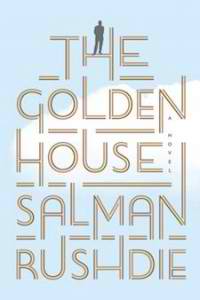
Published by Random House on September 5, 2017
Salman Rushdie explores multiple themes in The Golden House, including “the nature of goodness”. The concept is elusive, but he finds it in “unshakable love” and happiness, for as long as it exists until it is replaced by unhappiness. Goodness is always at war with its opposite, and Rushdie also explores the potential for both good and evil that resides in every person. Evil in the novel is most often represented by betrayal.
The nature of change, its inevitability and whether it is possible to change the soul, is another theme. An aristocratic man who calls himself Nero Golden has come to New York, leaving India and his Muslim heritage behind, because America is “the land of the self-made self” where it is possible “to move beyond memory and roots and language and race,” to “step away from yesterday and start tomorrow as if it isn’t part of the same week.” He has erased his part and started anew — or so he thinks. Eventually his sins of the past are revealed, as are their consequences.
Nero Golden’s story of entitlement is narrated by his young neighbor René, a Manhattan resident of Belgian heritage who fancies himself a filmmaker or at least a screenwriter. René’s parents are among the few who have discovered the true reason for Golden’s flight from India. René looks to Nero Golden for screenplay inspiration, as he looks to a woman named Suchitra for love.
Nero Golden has three sons, two (Petya and Apu) from the same woman and the third (D.) from another. Their familial ties might be strengthened when a new woman enters their father’s life, perhaps threatening their inheritance, but the children are divided in their response to Vasilisa Arsenyeva.
The first half of the novel sets up the characters and their relationships. The second half begins with René coming to live in the Golden household and all too wittingly getting caught up in a scheme that Vasilisa has hatched, a scheme that will cause him to betray his friend Nero and his lover Suchitra. In addition, Apu returns to India and discovers that the sins of the father are inherited by the son.
The story of “unshakable love” involves a woman named Riya Z and her improbable love for D (Suchitra’s love of René, on the other hand, gets a good shaking). Some early chapters are devoted to D’s gender identity issues, while some later chapters focus on Petya’s intolerance of those issues. Petya, a high-functioning autistic, is equally intolerant of Abu’s political beliefs, an animosity that Abu reciprocates, giving Rushdie an opportunity to present a microcosm of divided America. But betrayal is a pervasive theme in The Golden House, and one of the novel’s first betrayals occurs when Apu steals the affections of a beautiful Somali sculptor from Petya.
Divided America is, in fact, a recurring theme as, toward the novel’s end, the Joker defeats Batgirl in the presidential election. Some of Rushdie’s strongest writing dissects the belief (firmly held by voters who “brought the horror to power”) that “knowing things is elite and they hate elitists” so that “education, art, music, film, becomes a reason for being loathed.” Readers who might be scorned as “elitists” can find refuge in Rushdie’s pages, which presume a broad level of knowledge or at least enough intellectual curiosity to Google an unfamiliar name. Knowledge is not power, Rushdie writes; “knowledge is beauty.” And the only answer to the Joker, Rushdie tells us, is Humanity.
Rushdie packs so much into sentences that if they were water, a reader could walk on top of them. As is typical of Rushdie, the novel is packed with allusions and references to current affairs, history, politics, mythology, poetry, literature, film, and pop culture. Classics and the contemporary reside comfortably alongside each other, sometimes in the same sentence. This gives the book a cluttered feel, and while a book is supposed to be a messy house, it is difficult to journey through the rooms of The Golden House without tripping over the furniture. Still, even when he rambles, or especially when he rambles, Rushdie is interesting and enlightening.
As is also typical of Rushdie, the novel touches upon important social issues: the intersection of politics and religion; the tendency of oppressors to treat human life as expendable; “the modern obsession with identity” and its counterpart, the denial of racial heritage; the transformation of sexual identity; the gun culture; the ease with which a large percentage of the voting public can be conned, simply because they want to be conned; and the fact that an even larger percentage of the voting public care so little about their country that they don’t bother to vote. Well, look what that gets you.
Occasionally, amidst all the clutter and social observation, things happen, a plot develops, telling the tragic story of the Golden family. While generally relating that story in the first person from René’s perspective, Rushdie sometimes changes up the text with the techniques of screenplay writing and with a monologue imagined as a “collage” of conversations from which René has been edited out. As is often true in a Rushdie novel, there might be too much going on, as Rushdie’s mighty display of erudition sometimes gets in the way of telling a compelling story. But compelling or not, the story is fun and it offers enough moments of insight to make its reading a serious intellectual pleasure, although perhaps not a strong emotional pleasure.
RECOMMENDED